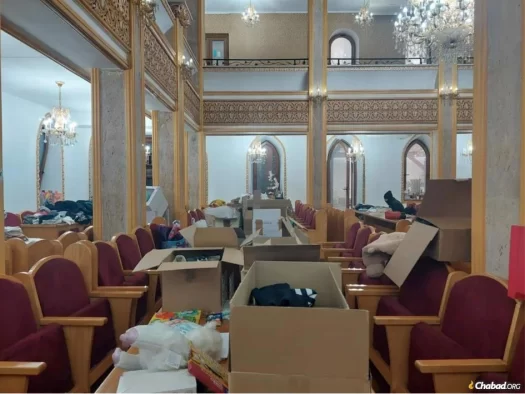
Chabad Aids 22,000 Jewish Refugees on Both Sides of Ukrainian Border
by Mendel Super – chabad.org
In the last two weeks some 22,000 Jewish Ukrainian refugees have streamed to the war-torn nation’s borders with the help of Chabad-Lubavitch emissaries on the ground. After a treacherous bus, car or train ride, they wait at one of Ukraine’s international border crossings for many hours and then their dash to safety is over.
But the journey has just begun. Usually arriving with little more than a carry-on bag and the clothes on their back, they are thrust into the world of the unknown, in foreign countries filled with people speaking languages they do not know.
The second phase of the journey is usually via Poland, Moldova, Romania, Hungary or Slovakia. There, Chabad emissaries and staff have set up refugee camps for the thousands coming through each day. At the Polish and Moldovan borders, Chabad has teams waiting with hot food ready to assist the bedraggled refugees after days of traveling. In Romania, Slovakia and Hungary, Chabad has secured private apartments and homes, hotel rooms and even entire campsites and hotels to house the refugees as they find their bearings and plan the next steps.
Many parts of the operation are coordinated by the Chabad-led Federation of Jewish Communities (FJC) of the former Soviet Union, and Rabbi Shlomo Peles, who directs Chabad’s crisis center in Kfar Chabad, Israel. Funding comes partially from generous donors around the world who visit Chabad’s Ukraine Relief Fund, which sends all the funds directly to Chabad’s hundreds of emissaries on the ground throughout Ukraine and all of Europe.
In Bucharest, Romania, Chabad—directed by Rabbi Naftali and Risha Deutsch, together with Rabbi Yitzchak and Dvora Lea Raskin—has been welcoming hundreds of refugees each day, providing them with a hot, fresh meal and finding them a place to stay. Chabad also deals with the various situations that crop up, like yesterday, when a woman from Odessa went into labor. Risha Deutsch rushed the woman to hospital, where she delivered a healthy child.
One of the first people the Ukrainian Jewish refugees at Chabad of Bucharest meet is Max Feferboim, who Risha Deutsch describes as her “right hand man.” Feferboim, 37, assists them the moment they enter the doors and often even before. He translates, calls hotels which he’s secured rooms in, helps them obtain pertinent legal documents and finds them doctors and medication.
But Feferboim isn’t an employee of Chabad. In fact, he’s been there only several days, after he escaped his hometown of Kiev (Kyiv). “I got a call from Chabad, they said a bus is leaving in two hours,” he says as he recounts his ordeal to Chabad.org. “I packed what I could, and got on the bus. Chabad paid for everything.” After a stop in Moldova, Feferboim continued on to Romania, where he met Chabad of Bucharest.

Voluteers Make All the Difference
After settling into an apartment Chabad provided, Feferboim returned to the Chabad center asking how he could help. “Many older people are arriving; many women and children are arriving alone [men between 18 and 60 must stay in Ukraine to help with the war effort, though there are exemptions, including for those who, like Feferboim, have three children under 18]. They don’t know what to do or where to go.” Feferboim, who’d just made the same journey, enlisted to help those arriving after him settle in.
He says Chabad’s work doesn’t stop. “They don’t think about themselves; only how they can help others.” He is amazed by how Risha Deutsch, a mother of six, is able to balance caring for hundreds of refugees and her own family. “Today was International Women’s Day, so I bought her a bouquet of flowers. She’s an amazing lady.”
Deutsch says that the help she is able to provide is thanks to her generous Bucharest Jewish community. She says that most of the accommodation they have secured is private homes that community members have graciously given. One woman in the community, Katya, works in real estate and was able to provide dozens of homes at Deutsch’s request. Unbeknownst to Deutsch at the time, Katya’s own mother was trapped in Ukraine. When Katya mentioned it later on, Deutsch located a family leaving her city who would take Katya’s mother along. “Yesterday, at 3 a.m., Katya’s mother arrived,” Deutsch says, relieved.
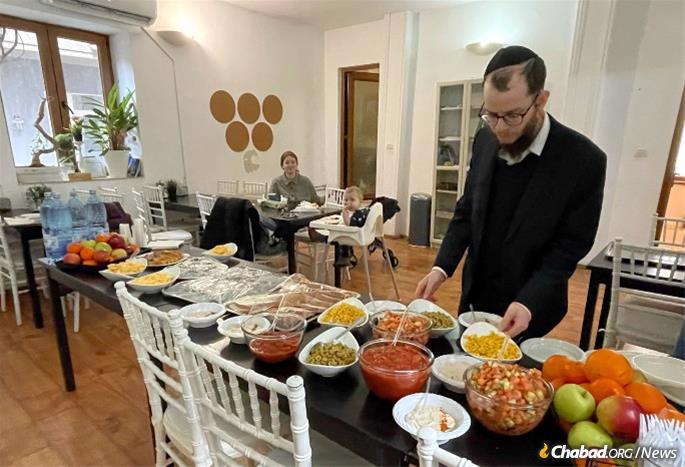
Just Arrived,and Cooking for Hundreds
In Jassy (Iasi), Romania, more than 200 miles away from Bucharest, Chabad has secured three hotels and is running a massive operation to feed and house the refugees. The effort is being led by Rabbi Shalom Gopin, a Chabad emissary from Ukraine who arrived in Romania only last week. It’s not Gopin’s first time on the run; in 2014 he fled Lugansk in eastern Ukraine with his community for Kiev, and established a new Jewish center in one of the capital’s suburbs.
Not pausing from his work, when he arrived in Jassy together with his wife, Chani, and children, he rented a hotel and he and his wife began cooking for hundreds of people for Shabbat. Very quickly, they ran out of food and had to ship more in from Bucharest. “We’re helping people move on to their next destination, connecting them with Chabad communities in Switzerland, France, Holland, Germany and Austria, and assisting people immigrating to Israel,” explains Rabbi Gopin.
Gopin puts things into perspective: “This is a humanitarian catastrophe that Europe hasn’t known since World War II. You cannot imagine the terrible pain.”
Two-hundred-forty miles west, Rabbi Dovber and Fraidy Orgad, co-directors of Chabad of Cluj-Napoca, have been absorbing hundreds of refugees every day. “It’s now falling into a routine,” Rabbi Orgad says of his mammoth operation. He rented the biggest hotel in town, koshered the kitchen and transformed it into a refugee camp overnight. “Our cook is a Ukrainian refugee,” he shares. A community member helped secure the hotel for the rabbi, and one of the first groups to stay there was the Chabad-run children’s home in Zhitomir, Ukraine, who’ve since flown to Israel.
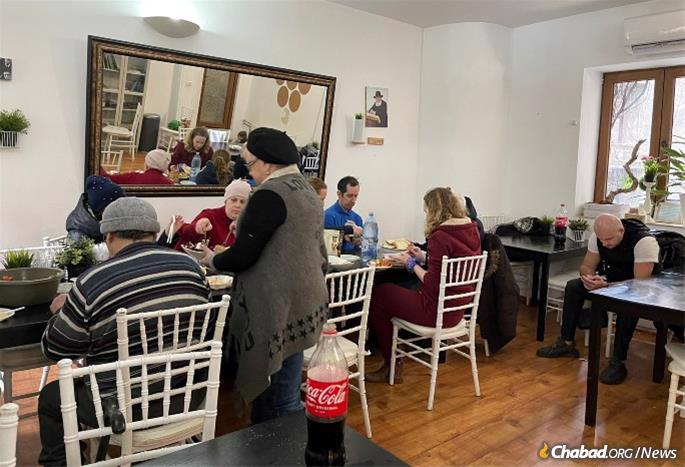
An Unimaginable Need
More than one million Ukrainian refugees have crossed over into Poland, including many Ukrainian Jews who Chabad helped secure passage first to Lvov (Lviv), near the Polish border. Chabad of Warsaw’s Rabbi Sholom Ber Stambler is coordinating relief efforts with a team of rabbinical students he’s dispatched to the border, while in Warsaw he’s opened Chabad’s kitchen to run all day and night. Hotels have been rented and apartments made available to the refugees. Chabad helps with transport from the border, Covid tests before boarding onward flights, and clothes, diapers and toys. “We’re helping in any way we can,” says Stambler, whose brother and cousin are both Chabad emissaries in Ukraine.
In Krakow, Poland, a city steeped in Jewish history, Chabad’s Rabbi Eliezer Gurary is working with a local hotel and several private apartments and homes to accommodate the many refugees passing through his city. “Many of them need a lot of help,” he says, describing how he just sent children to the hospital for treatment, assisted a woman with kidney issues find a doctor and helped overwhelmed new parents of twins born in Kiev on Feb. 25. Together with the other Chabad emissary family in town, Rabbi Refael and Dini Popack, they’ve been working around the clock. “They spent all day preparing food,” Gurary says of the Popacks, though they also work with a caterer to send food to the hotels.
Gurary describes how people arrive at the border with no way forward and in dire need of help. “Two women came with a child, after four days of traveling. They were almost starving. We sent a driver to the border to pick them up.” He says that the work isn’t funded by any one organization or individual, rather it’s people from all over the world who contribute whatever they can. Soon, he says, a truck with supplies will be arriving from London, sent by the Chabad community there.

At the Moldovan border, Rabbi Zushe Abelsky of Chabad of Moldova has a team of 40 staff on the ground, greeting the refugees and assisting them with their onward travel, accommodations in Kishinev, and food right at the border. “We’re helping them get their dignity back,” Abelsky says. “These are people who left an entire life in Ukraine, losing everything overnight. After 50 hours on the road, our job is to embrace them, feed them and house them.”
Abelsky secured an entire campsite outside of Kishinev, and another four hotels, as well as dozens of private homes. Altogether, Chabad of Moldova has 650 beds and each day doles out 3,500 portions of food. They have already assisted 10,000 refugees. Refugees are being bussed from the border to their accommodations around the clock. Chabad’s Kishinev kitchen is open from 9 a.m. until 9 p.m., the kitchen staff led by a chef who fled Odessa. “I’ve been a chef all my life,” she told Abelsky, “and I’ve never seen anything like this.”
As Abelsky speaks to Chabad.org, a plane from Hatzalah Air—the air travel branch of the Jewish volunteer ambulance service—is evacuating a woman from Kishinev to a Berlin hospital. “A girl came over to me on Shabbat, saying she needs help.” The girl, a refugee from Kiev, told the rabbi that her mother has been in a local hospital for three days with internal bleeding, which she attributed to the stress of escaping Ukraine. She said her mother wasn’t receiving a high enough level of care, and the local hospital was unable to stabilize her. Recognizing the gravity of the situation, Abelsky made some calls then and there, and made plans for the woman to be whisked off to Berlin for better treatment.
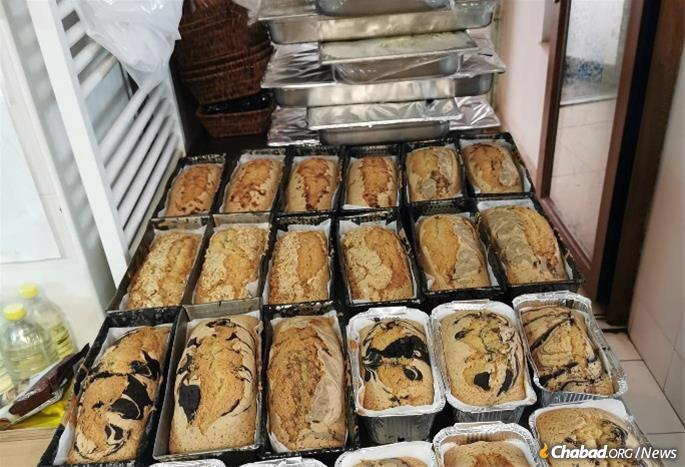
‘The Phones Don’t Stop Ringing
“The phones don’t stop ringing,” Abelsky says. “Every hour is something different.”
Southwest of Ukraine, Hungary’s Chabad communities are also absorbing refugees, though as a smaller border, it isn’t as busy as Poland, Romania and Moldova. Close to the border, Rabbi Shmuel and Riki Faigen, co-directors of Chabad of Debrecen, have been receiving a constant flow of refugees, though the rabbi says it’s slowed significantly in the last two days.
In Budapest, Rabbi Boruch Oberlander, director of Chabad of Hungary, says that over Shabbat they had dozens of guests, while just hours before Shabbat they prepared food for a group of 200 refugees who were soon flying out. A member of his community, Gyuri Szabo, traveled last week to the village of Kerestir, where he prepared accommodations and food for a group of 120 refugees from Uman, Ukraine, including pregnant women and infants. “Many more groups came through, we helped everyone,” Szabo says. “We are merely G‑d’s vehicles, doing what we need to do.”
Slovakia is now seeing many refugees come through, says Rabbi Boruch Myers, co-director of Chabad of Slovakia with his wife, Chana, who last week said there was only a trickle. “We had a big Shabbat dinner,” Myers says. “We invited a local Russian-speaking family and their kids played with the Ukrainian refugee children, it was heartwarming.”

Every Story Is Different
“Each person has their own story,” reflects Chana Myers. She speaks of one woman, whose grandparents spoke Yiddish but herself received no Jewish education. “She lit Shabbat candles here for the first time.” Another woman had left her husband and older son behind, where they were drafted to fight in the war, not knowing when she’ll see them again. Chana Myers just witnessed a tearful reunion between a younger family who arrived last week and their elderly parents who arrived just hours before, after four days on the run. “All beautiful, dignified, helpful people who cannot stop thanking us—we keep telling them there’s no need to!—and whom, under tragic circumstances, we’ve become privileged and humbled to know,” she says.
Rabbi Myers says that in many ways, the story of the refugees is the story of Chabad’s impact and reach in Ukraine. Illustrating his point, he describes how an older woman came in before Shabbat, accompanied by her daughters, who translated into Russian for their mother. Myers invited them for Shabbat, and the woman’s daughter explained that the rabbi wants to have them over. The older woman looked at Myers and said one word: “Farbrengen?” pulling a small candle out of her pocket and asking if she could light it for Shabbat.
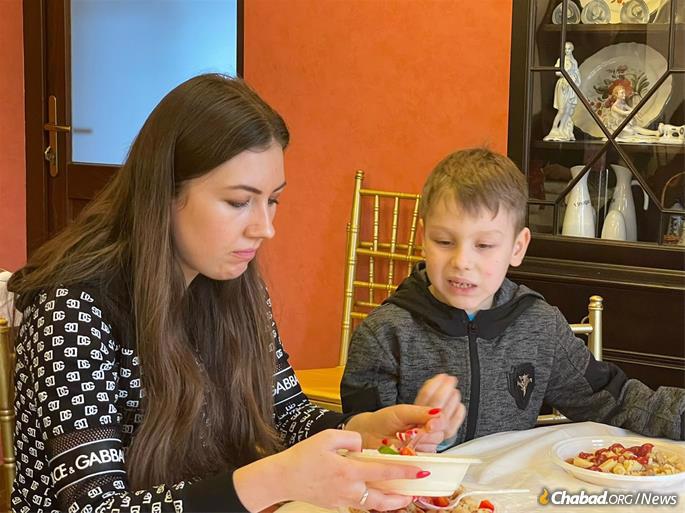
After the service and kiddush, one refugee stood up and addressed the crowd. “Soon it will be Purim,” he said. “G‑d saved us then and He will save us now.”
In Bucharest, Feferboim says he’s thankful to be alive. “In Kiev we slept in an underground parking lot for a week, it was terrifying. Now everything is good. If not for Chabad, I would still be in Kiev, but G‑d had other plans.”
The Ukraine Jewish Relief Fund has been established to help provide assistance to the Jewish communities in Ukraine impacted by the war.
Click here for a prayer you can say and a list of good deeds you can do in the merit of the protection of all those in harm’s way.












